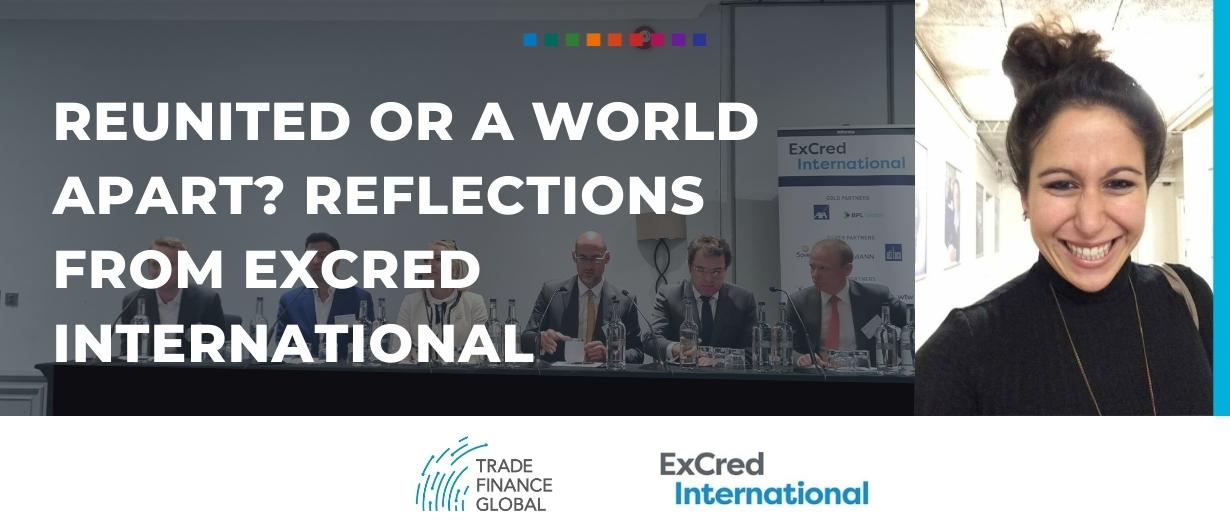International politics plays a key role amid differing views on international trade, macroeconomic trends, and environmental sustainability.
Reflecting back on key themes from the ExCred International 2022 conference in London, it is clear that the uncertainty of globalisation, driven by geopolitics, is a hot topic in today’s world.
The global recession illustrates how geopolitical frictions and fragmentation, coupled with the pandemic aftermath, have destabilised the economy.
The US-China trade war, trade sanctions on Russia, and disrupted exports from Ukraine are posing significant supply chain challenges.
According to Marc Auboin, economic research counsellor at the World Trade Organization (WTO), the recent years have been “the ultimate test of the trading systems’ resilience”.
Questions throughout the day at ExCred focused on forecasting where global trade will be a year from now.
To help answer these questions, many experts examined the world through two lenses: regionalisation (cooperation within a region) and globalisation (cooperating on an international scale).
These two broad concepts help to frame the pattern of recent trade developments and may help predict how future trade will look.
Regionalisation – it’s a small world after all
Friend-shoring
With a heightened geopolitical climate, countries’ political agendas are having a greater impact on the trade cycle. This means that countries are more likely to collaborate within their regions.
“Friend-shoring” occurs when firms opt to produce goods in countries they are either geographically or politically close to.
While this can add another layer of complexity to supply chains, for businesses, friend-shoring can provide greater stability, which is vital to both the success of new investments and their ability to trade.
Consequently, many experts predict that this will segment the world economy into a collection of trading blocs or alliances, evoking flashbacks to the cold war-era East-West divide that has become more vivid since Russia’s actions in Ukraine.
According to a World Trade Organization (WTO) study on the Ukraine Crisis, the formation of blocs “could reduce global GDP in the long run by about 5 per cent, notably by restricting competition and stifling innovation.”
Protectionism is another political tool often used in situations like this, in which government policies safeguard domestic industries from foreign competition.
On a mass scale, however, putting national interests first – for instance by limiting wheat exports to protect domestic supplies at the expense of other trading partners – is only going to worsen the global food crisis.
(Source: Statista)
Neighbours
Seized ships and blocked ports are making the trade environment even more challenging but by shortening the supply chain, some of these trade risks can be mitigated.
To do so, companies must spread production across multiple locations rather than focusing on one, increasing global resilience to regional shocks.
At Home
Paul McComb, director of UK exports at the Department for Trade (DIT), said, “Brexit has forced UK companies to truly understand their supply chains, while the pandemic exposed their dependence on others.”
As a result, all companies have been forced to reevaluate where they source their products and how they can produce them closer to their consumers.
This is reinforced through government campaigns such as the ‘Made in Britain’ registered mark.
Society
The power of the people and an active civil society were also common themes regarding social change at ExCred.
There are many ways that society can affect trade:
Firstly, active consumers force businesses to consider the repercussions of their actions.
Growing consumer pressure surrounding the ESG agenda is pushing businesses to be more ethical and to be selective with who they do business (e.g. Russia and China).
Secondly, consumer confidence affects supply and demand, and therefore inflation.
Panic buying of certain household items left supermarket shelves empty and sparked concerns over the stability of the economy.
Lastly, there is a clear correlation between rising food prices and political instability.
As inflation and living costs rise, people become less financially stable and increasingly vulnerable.
In these times, extreme solutions begin to seem reasonable, as was the case following the period of hyperinflation in post-WWI Germany.
Jørn Fredsgaard Sørensen, EKF
“Globalisation is not irreversible.
Globalisation needs to find its new equilibrium”
Globalisation – we’re all in this together
Diversity
Despite mounting isolationist sentiment of detaching from global affairs, foreign goods remain popular with consumers, pushing demand even higher.
Additionally, the global economy is diversifying due to a growing number of emerging markets, opening up new investment opportunities for investors.
This is because, in times of high inflation, investors want their money to work harder, which means investment opportunities increase.
Happy days
There is some optimism that can be drawn from recent events.
During the early days of the pandemic, global trade allowed medical professionals to allocate surplus supplies to address shortfalls in the hardest-hit regions.
Applied to less life-or-death scenarios, global trade could help address the supply-demand balance, providing an effective mechanism for combating inflation.
Furthermore, increasing supply chain resilience will directly benefit society, improving the lives of people around the world.
Henri d’Ambrueres, principal at HA Conseil said: “We cannot afford to forget long-term goals because there is a conflict today.”
A changing status quo
Through technology, we have connected the world, but political divisions have a more profound impact on global trade than the distance or border we must cross.
The status quo has been challenged and, as Claudia Dos-Santos, associate director, supply chain finance at Lloyds Banking said, “it is naive of us to expect the status quo to remain.”
Ultimately, it is unclear how globalisation will evolve.
























